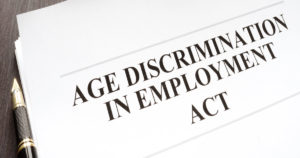Age Discrimination in New Jersey
 Older, more experienced individuals who are seeking employment may find themselves discouraged by numerous postings stating that employers are looking for recent graduates or employees who have worked under a certain number of years in the field. Although some of these postings may be relevant to the position itself, many more are simply thinly veiled attempts to discourage older individuals from applying, as many employers see older employees as a liability.
Older, more experienced individuals who are seeking employment may find themselves discouraged by numerous postings stating that employers are looking for recent graduates or employees who have worked under a certain number of years in the field. Although some of these postings may be relevant to the position itself, many more are simply thinly veiled attempts to discourage older individuals from applying, as many employers see older employees as a liability.
Age discrimination, however, can become more virulent as aging workers are pushed to the side for no other reason other than that they are getting older. Whenever a company wants to save money, it knows that it can subtly hint that older workers should retire, let them go, or make their jobs so unbearable that they resign of their own volition. Workers may suspect that something is wrong without realizing their employer’s endgame and contact an experienced South Jersey employment lawyer when it is clear that age discrimination is happening in the workplace.
Is Age Discrimination in the Workplace Persistent?
As society changes, discrimination based on race and religion is becoming easier to detect. Social progress and a more discerning look at employee rights in the United States have helped both minorities and women to flourish in the workplace. However, despite this progress, instances of discrimination based on age persist. Although the Equal Employment Opportunity Commission (EEOC) reports that the number of age discrimination cases has decreased, a survey conducted by AARP states that 77 percent of Americans between ages 45 and 54 say employees face age discrimination.
According to AARP, around one in four workers over the age of 45 has heard comments about their age at some point. Three in five older workers state that they faced age discrimination whether they reported it or not. Moreover, over three-fourths of older workers believe that age discrimination will become an obstacle when they search for another job. When these workers are forced to leave their jobs or are terminated, 90 percent of them do not earn as much money in another position.
Why is Working a Necessity for Older Americans?
Although the future of Social Security and universal health care in the United States are hotly debated topics, the reality is that many older Americans must work. Indeed, it is not uncommon to see individuals well past the age of retirement taking low-paying jobs simply for the health plans that are included in them. At times, these jobs supplement a senior’s income in a world where their retirement does not go as far as it once did.
According to AARP, 29 percent of American homes are led by someone who is over the age of 55. These people do not have any savings for retirement, or they cannot rely on a pension when they choose to retire. Moreover, older workers are three times more susceptible to develop a disability.
Is There Legal Protection Against Age Discrimination?
The Age Discrimination in Employment Act (ADEA) protects individuals from age discrimination in the workplace. The ADEA protects individuals over the age of 40 from discrimination, but individual states have enacted their own laws that protect younger workers, with New Jersey being one of them. The ADEA is clear and concise on what employers cannot do in the workplace and bans age discrimination based on the following:
- Hiring
- Firing
- Pay
- Job assignments
- Promotions
- Layoffs
- Training
- Fringe benefits
When age discrimination occurs in New Jersey, victims can cite both the ADEA and state laws in making an effective case. The New Jersey Law Against Discrimination (NJLAD) provides rights specific to employees in the state. Under New Jersey law, retaliation is illegal, and companies can face additional penalties up to $10,000 after the first violation and $50,000 for the third offense.
If older workers are denied a job during the application process, they may file a complaint citing the NJLAD. Older workers have two years from the date of the act of discrimination to file a complaint. Under the NJLAD, older workers can be placed in the job they were denied, and they may seek judicial remedies that punish the employer and help the older worker regain financial security.
What are Common Signs of Age Discrimination at Work?
Age discrimination can occur in any office at any time, and the subtle signs of discrimination might exist without the victim noticing. Some people may not know that they are suffering from discrimination because they simply never thought that it would happen to them. Workers should look out for these signs of age discrimination and reach out to a lawyer as soon as possible to determine the next steps to take.
Harassment. Harassment at work might be based on the victim’s age, or they may feel as though everyone is ganging up on them. When it is clear that the victim is walking into a hostile work environment every day, they should speak to a lawyer and review their rights. In extreme cases, harassment will increase, leading the victim to suffer from more than just remarks or threats. Older women may suffer from sexual harassment, and older men may suffer from physical attacks or abuse.
Snide remarks. These might speak to the victim’s age or someone might intimate that the victim will be fired, should be let go, or that they are not keeping up with the times. Although the victim may choose to ignore these comments, they may create a hostile work environment. If the comments come from someone in a position of power, the victim is right to think that their job may be in jeopardy.
Lack of promotions or upward mobility. A career that has stalled might be surprising for the victim because they once had a career trajectory at the company that they believed was promising. Now that they are unable to receive promotions or take on more responsibility, these employees might worry that they will be terminated or slowly pushed into retirement.
An obvious pattern of hiring younger employees. This tells older workers that the company wants to hire cheaper labor. Although corporations have every right to hire younger workers for entry-level or intermediate positions, there comes a point at which older workers believe the company is doing nothing but hiring younger, less costly employees.
Coded language. Job advertisements may speak of a fast-paced environment, with tech-savvy employees and an energetic atmosphere. Some companies might advertise for digital natives or those who love change. Although this language may seem harmless, it might say to older employees that they are not welcome.
Training and certifications go to younger employees. A suspicious pattern may be observed in an office where these certifications are needed to advance in one’s career. Although there are several different forms of certification or training available to employees, older workers might be told that they do not need this training because they are older and close to retirement. This might also impact the amount of money the worker can earn during the year.
Overt comments and assumptions about the employee’s age. These comments occur when certain people in the office make snide remarks about the worker spending too much time with their grandchildren because their adult child, for example, just got married. Broad assumptions about an older worker will make them question their life choices, and it might cause issues at home. The victim is losing ground at work, and they may work themselves too hard or fracture relationships in an effort to save their jobs.
Handing off assignments to younger employees. This is a common sign that older workers will continue to lose responsibilities or assignments. These changes might be subtle depending on the situation. For example, an older worker with a large insurance firm might be asked to let a younger worker tag along on an important assignment. Before long, that younger worker has been given that assignment, leaving the older worker feeling insecure in their position. These changes might be accompanied by more remarks about the victim’s age and assumed desire to be home more often.
Older workers are forced to complete mundane tasks. This is a tactic used to force an older worker to retire. A situation such as this makes it clear that the older worker is not valued by the company. It is as if the company is trying to force the worker to retire by making their job as unbearable as possible. An older worker should not quit under these circumstances. They should reach out to an employment lawyer and explain the situation before acting.
A sense of isolation. Making an older worker feel isolated is easy when they believe they are being left out of the social circle in the office. At times, this is nothing more than an unfortunate personality difference that rubs people the wrong way, but there are times when it is intentional and highly discriminatory.
Subtle hints that retirement is an option. These hints can make the office atmosphere awkward because the worker feels as if everyone hates them or wants them to retire. Although retirement may be appealing for some older workers, there are plenty of people in the workforce who cannot afford to retire or simply do not want to retire at all.
Eliminating positions or changing titles. Organization changes such as these make older workers feel uneasy because they typically have nowhere to go. If the company starts eliminating positions that are almost exclusively held by older workers, it helps to reach out to an employment lawyer for more information. If older workers are constantly changing titles, they might believe the company is trying to make them so uncomfortable that they will quit or retire.
Mass layoffs. These occur every year in the United States, but they are not always discriminatory. When mass layoffs disproportionately affect older workers, these older workers may file a claim alleging age discrimination.
A sudden need for an employee improvement plan. A bad performance review and a required performance plan might shock an older worker because they have had nothing but good performance reviews up to that point. The only explanation, in most cases, is that the victim is being targeted. The company might also use these poor performance reviews to justify terminating the victim.
Unfair disciplinary action. This works in much the same way, as it allows the employer to fire older employees for transgressions where younger employees face little to no disciplinary action.
In any of these situations, it may become clear that an older worker is suffering in a hostile work environment. Although this term is often reserved for sexual harassment cases, it applies when an older worker feels as though they cannot come to work without facing the scorn and ridicule of their coworkers.
Why Should I Try to Stop Age Discrimination?
Although it may not be as malicious as race discrimination or sexual harassment, age discrimination is no less harmful, seeing as it bars an entire demographic from employment and the health benefits therein. Those who are victims of age discrimination should seek legal counsel as soon as possible, not only to right a wrong, but also to put their own life back on track.
Stopping age discrimination often requires the assistance of a lawyer, but there are other steps older employees can take to reduce the risk of age discrimination in the workplace, including the following:
- Remaining abreast of technological advancements
- Taking online or free training courses
- Remaining as fit as possible
- Creating a job of one’s own
Although workers who may face age discrimination should not be tasked with avoiding or preventing discrimination at all times, it helps to take steps that make it difficult for employers to engage in discriminatory practices. Even if age discrimination is happening right now, legal action might prevent it from happening to someone else in the future.
Can I Recover Compensation for Age Discrimination at Work?
If an employee files a claim against their employer for age discrimination, they are eligible for several types of compensation. The total value of the lawsuit changes based on how the victim was terminated or lost opportunities, how long the discrimination went on, and how egregious the company’s actions were. Victims should review options for compensation with a lawyer before filing a lawsuit so that it is clear what the victim can expect.
Back pay. Back pay is available when victims know that they should have been promoted, had more opportunities to make money, or taken a different career path if not for the discrimination that occurred. Back pay is calculated from the moment the victim claims the discrimination began, and it should include any reasonable concessions, bonuses, commissions, or additional salary the victim would have earned. If workers are placed back in their jobs, they may request pay raises equivalent to what they should have received before the discrimination began.
Future pay. This is calculated based on the victim’s career path and desire to remain with the company. Someone who planned to retire at 55 and is suddenly let go or forced to retire at 50 can easily show how much money they should have made in that five-year window. Additionally, the victim may have been forced to take a low-paying job to survive. A lawsuit then calculates the difference between what the victim earned and what they should have earned.
Lost benefits. Losing benefits is often devastating for the victim because they no longer have health, dental, or vision insurance; lose their vacation days; cannot take a sick day; and might lose valuable life insurance in the process. Losing these benefits may be considered such a betrayal that the victim might suffer from severe health problems, or their family members may experience health issues that should have been treated using these insurance policies.
Emotional turmoil. Anxiety and depression can occur the moment the victim is wrongly terminated or forced into early retirement. They may lose their sense of purpose; fear how they will provide for their family; and suffer from anxiety, depression, and/or other mental health conditions.
Punitive damages. These are available to victims of age discrimination only in extreme circumstances. New Jersey calls them exemplary damages, and they may be awarded at trial if the management or executive team was determined to be willfully indifferent to discrimination and did not fear it would be punished because of its misconduct.
Why Should I Hire an Employment Lawyer?
 Hiring an employment lawyer is often the only reasonable step for someone who believes they are the victim of age discrimination. When the situation seems to be out of control or it is unclear what the employer’s motivations might be, retaining an employment lawyer offers a buffer between the employee and the actions of their employer.
Hiring an employment lawyer is often the only reasonable step for someone who believes they are the victim of age discrimination. When the situation seems to be out of control or it is unclear what the employer’s motivations might be, retaining an employment lawyer offers a buffer between the employee and the actions of their employer.
An employment lawyer can reach out to the employer to understand the nature of the situation. A cease and desist letter may be used to prevent the employer from engaging in further discrimination, or the lawyer may need to file suit to recover damages for their client. In either case, a lawyer is the best person qualified to speak on the matter because they understand both federal discrimination laws and statutes specific to New Jersey.
A lawyer will guide the litigation from the first signs of discrimination to a jury trial, if necessary. Victims should allow a lawyer to accept all communications for the stakeholders in the case. A lawyer should also know the outcome the victim prefers so that it is easier to create a compelling case that helps victims recover. Some workers may prefer to walk away with their pension or retirement plan because they no longer have the motivation to work. Others may want to keep their jobs because it is a good position that pays well. Still more may require quality references from the discriminating employer and compensation for their losses.
South Jersey Employment Lawyers at Sidney L. Gold & Associates, P.C. Advocate for Those Affected by Age Discrimination in New Jersey
If you or someone you love believes they were a victim of age discrimination in the workplace, you are urged to contact the South Jersey employment lawyers at Sidney L. Gold & Associates, P.C. For over 30 years, our team has advocated for the rights of workers. Call us today at 215-569-1999 or contact us online for a free consultation. Located in Pennsauken, New Jersey, we serve clients throughout South Jersey, including Cherry Hill, Haddonfield, Marlton, Moorestown, and Mount Laurel.





























